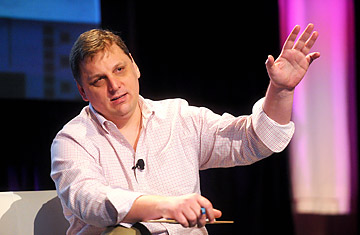
TechCrunch founder Michael Arrington in September 2010
Privately, those in the know are questioning whether Arrington will survive the three year tie-in he's signed. "Three years is too long," one said. "I give him a year, even with the money on the table.
— The Guardian's Jemima Kiss, in a blog post on AOL's acquisition of TechCrunch in September 2010
Some train wrecks are compelling because they're unexpected. The one going on at AOL and TechCrunch, however, felt inevitable all along. From the moment that the online media company sealed the deal to buy Silicon Valley's iconic tech blog — which it did onstage, at the TechCrunch Disrupt conference in San Francisco last September — you could see disaster in the works. I was in the audience that day, and even then the mood was somber rather than celebratory.
The TechCrunch/AOL relationship began to visibly collapse a week ago, when Fortune and The New York Times reported that Michael Arrington was launching a fund to invest in high-tech startups. Called the CrunchFund, it was backed by AOL and a roster of blue-chip venture-capital firms. The news that the Valley's most prominent writer planned to put $20 million into the companies his site covered put the blogosphere opinion machine into instant overdrive.
What happened next remains murky. At first, AOL CEO Tim Armstrong explained that Arrington didn't have to follow AOL regulations which bar its journalists from having a financial interest in companies they write about. Then an AOL spokesperson said that Arrington was stepping down from the co-editorship of the site he founded and would contribute only as an unpaid blogger. Or perhaps he was leaving TechCrunch, period. Media reports differ on whether Arianna Huffington — president of the AOL Huffington Post Media Group and Arrington's boss — knew about the CrunchFund all along or pushed him out after learning about it.
As I write this, Arrington says that he wants AOL to either guarantee TechCrunch's editorial independence or sell the blog back to him. Fortune's Dan Primack is reporting that AOL has chosen a third route: Terminating Arrington. I expect further twists and turns before the saga reaches anything resembling a conclusion.
High-stakes, high-profile confrontations have been a recurring theme in Arrington's career. When he proposed a Web-centric tablet called the CrunchPad and teamed with a hardware maker to help make it a reality, his partner decided at the last moment to cut Arrington out of the project, releasing the tablet as the spectacularly unsuccessful JooJoo. Then there was the series of popular TechCrunch 50 conferences; they came to an end when Arrington got into a public spat with his collaborator, Jason Calacanis.
(Full disclosure: My wife helped out with one of the events that Calacanis put on after he broke with TechCrunch. And I'm a tech blogger myself, sometimes writing about the same topics covered on TechCrunch — although my site, Technologizer, is gnat-sized by comparison.)
It's no surprise that the very notion of the CrunchFund has plenty of people aghast, including TechCrunch competitors. (Kara Swisher of All Things D rips into it in entertaining fashion in this post.) Traditionally, journalists bend over backwards to avoid both the perception and the reality of conflicts of interest (see my disclosure about my wife above); during twenty-plus years in print and online tech journalism, I've never invested so much as a nickel in a company I was likely to write about. But TechCrunch was never a traditional site, and by forming the CrunchFund, Arrington was merely diving head-first down a slippery slope which he's tottered on for years, as anyone who's paid attention already knew.
When Arrington started TechCrunch in 2005, he was a startup executive, angel investor and lawyer: A 2006 Wall Street Journal story, published when TechCrunch was just beginning to make a name for itself, noted he sometimes invested in companies he wrote about and quoted him as saying that his site was "all about insider information and conflicts of interest." In 2009, he declared that he was winding down his investments in the interest of deflecting criticism. But by April of this year, he announced that he was again funding startups of the sort that TechCrunch covers, and that he'd disclose them on the site when relevant.
TechCrunch may be extraordinarily well-read in the industry it covers, but it's never been universally loved, and neither has Arrington. All along, it's frequently been accused of using its outsized influence to secure exclusives and punish companies that don't provide them. Arrington has pretty much acknowledged it does so, in an unsettling post that simultaneously spoke of his "respect" for a prominent Web entrepreneur while casually mentioning the "sordid" details about her past he was choosing not to disclose.
